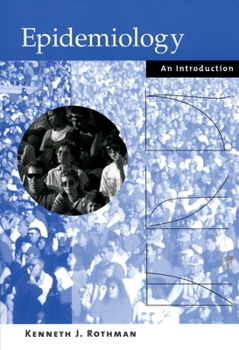Epidemiology: An Introduction
Select Format
Select Condition 
Book Overview
In the past thirty years epidemiology has matured from a fledgling scientific field into a vibrant discipline that brings together the biological and social sciences, and in doing so draws upon disciplines ranging from statistics and survey sampling to the philosophy of science. These areas of knowledge have converged into a modern theory of epidemiology that has been slow to penetrate into textbooks, particularly at the introductory level. Epidemiology:...
Format:Paperback
Language:English
ISBN:0195135547
ISBN13:9780195135541
Release Date:February 2002
Publisher:Oxford University Press, USA
Length:240 Pages
Weight:0.90 lbs.
Dimensions:0.6" x 9.1" x 6.1"
Customer Reviews
6 ratings
Dense
Published by Thriftbooks.com User , 6 years ago
I found Rothman's text to be very dense and technical. It demands complete attention to read, you cant miss a single sentence. Only a few chapters in, but this doesn't feel like a good introduction. It feels more aimed to epidemiologists, not students.
Best conceptual epi book published to date
Published by Thriftbooks.com User , 19 years ago
To my knowledge, this is the best and simplest textbook in epidemiology that has been published to date. I could compare it with practically all the 'mainstream' textbooks that I have been using, more or less recent, and more or less detailed textbooks. If a potential reader has already some familiarity with epi this is not the best reference in terms of details (R & G "Modern Epi" is far better), but it can definitely be considered the best reference available for epi concepts. Ideal to refresh a tired epi mind. If a potential reader had no prime in epi, this is an excellent prime. A warning: if you are looking for a text 'for dummies' filled with smart tips and mechanical shortcuts, this book is probably not what you are looking for. Actually the main 'side effect' of the book is that it forces you to 'think,' furthermore with your own head. The book is simple but never poor; it focuses on concepts through examples, what a reader needs to begin mastering the subject. One of the main ideas that I found useful is that formulas are not the goal of epidemiology: they serve the concepts & the context that frames the problem or question. When you read a chapter a second or a third time, later in your studies, you realize how carefully thought and written this book is: I believe it is difficult nowadays (in any field) to find a textbook so sound and well constructed. I would definitely recommend it to anyone interested in epidemiology at any level.
Thought provoking, direct, and well written
Published by Thriftbooks.com User , 20 years ago
This is the best epid primer based on my growing experience with epid texts. It is concise and uses good examples. I refer to it regularly. The text also is a helpful companion to Modern Epidemiology (Rothman and Greenland).
A graduate student's salvation!
Published by Thriftbooks.com User , 21 years ago
As a graduate student in public health, I found this book to be a life-saver when it came time to study for my comprehensive exam. Concepts are laid out very clearly, but not over-simplified. The book progresses through the mainstays that you need to know in the proper order and at the right pace. Plus, the writing style is...friendly (no other word will do!). The book is far from intimidating for a new student, but has sufficient depth so that even a doctoral level epi student will reach new levels of insight into familiar concepts.I especially appreciated the fact that Rothman uses social behavior examples, not only biomedical ones. (Critics who have alleged that Rothman overlooks "root" or "upstream" contributors to disease causation may be surprised to note that he draws upon domestic violence and substance abuse for this purpose.) I would also like to address the comments of the first reviewer on this list, who woefully misrepresents Rothman as "anti statistics." In this text, Rothman provides formulas for everything from pvalues for stratified data to logits, and quiz questions at the end of each chapter so that you can test yourself as you learn to calculate. Rothman holds a joint doctoral degree in epidemiology and biostatistics. His unerring grasp of biostatisics is precisely what allows him to out-think the average mathematician who conducts tests or follows particular procedures by rote or convention. Instead, Rothman uses artistry and originality in his practice of applying statistics to public health. As a teacher of these methods, he is unparalleled.This book is simply the best introductory epidemiology text on the market!
An excellent introduction
Published by Thriftbooks.com User , 22 years ago
"Epidemiology: An Introduction" is a pleasure to read. My introductory epidemiology class at UNC-Chapel Hill used an advanced printing for our textbook. I find Rothman's writing to be excellent: clear and concise, but not "dumbed down." He explains complex concepts in a straightforward and accessible way. If you are taking an introductory epidemiology course, purchase this book and read it, even if it is not your required text! A layperson with some background in the sciences and an interest in epidemiology would find this a good read as well.
Harmony in simplicity and scientific accuracy
Published by Thriftbooks.com User , 22 years ago
It may be difficult to write a simple book and even more difficult to write a scientifically correct book. It takes a master, however, to combine simplicity with scientific accuracy, depth and insight in an introductory book. Ken Rothman has accomplished just this with his new textbook.





